



Side 1
1. Besame Mucho
2. Take Me Back To My Boots And Saddle
3. If You Ever Should Leave Me
4. My Baby's Gone
5. Let's
6. What's Mine Is Mine
7. I Still Love You
8. She's a Real Lovin' Baby
Side 2
1. Start Lovin' Me
2. Outside Of Paradise
3. I Still Love You
4. All About Daddy
5. I'm The Baby Now
6. Party Time
7. Crying All Alone
8. Wine-O
I remember feeling disappointed by this LP when I bought it twenty years ago in some long vanished record shop. Having never actually heard the Ray-O-Vacs, I was expecting some rockin’ R&B vocal group action, maybe similar to the Dominoes, the Clovers, the “5” Royales, and other early 1950s groups. Instead I found myself listening to something rather different and I didn’t quite know what to make of it. So I stuck the album on the shelf and rarely listened to it again. Hell, I never even wondered about where they got the group name from, only discovering recently that they were named after a make of battery.
 Now that I’ve reacquainted myself with the album as I plough my way through the conversion of the Boogie Woody vinyl vault to a digital format, I find myself appreciating the sheer genius of the music contained in the unjustly neglected grooves. The Ray-O-Vacs’ sound is rooted in that of the jive groups of the late 1930s and the 1940s and is similar to that of other self contained vocal / instrumental outfits like The Red Caps or The Four Blazes.
Now that I’ve reacquainted myself with the album as I plough my way through the conversion of the Boogie Woody vinyl vault to a digital format, I find myself appreciating the sheer genius of the music contained in the unjustly neglected grooves. The Ray-O-Vacs’ sound is rooted in that of the jive groups of the late 1930s and the 1940s and is similar to that of other self contained vocal / instrumental outfits like The Red Caps or The Four Blazes.
These sides are dominated by the smoky lead vocals of Lester Harris and Herb Milliner, with brilliantly sparse backing arrangements featuring tasty tenor sax and piano fills weaving in an out of the vocals. They are a lesson in the art of being effortlessly cool. Even such apparently unpromising material as the hokey “western” song “Take Me Back To My Boots And Saddle” is transformed into a broadcast from the Planet Hep.
Information about the Ray-O-Vacs can be hard to come by. They were from New York and kicked off their recording career with Coleman Records who released 5 singles by the group in 1949. Their first side, “I’ll Always Be In Love With You,” gained some modest chart success and was re-released some years later on Sharp. Two further Coleman sides, “Happy Am I” and “Hot Dog” were re-released on the Savoy subsidiary Regent in 1951. The only Coleman side on this collection is “I’m The Baby Now” which is a slightly rawer version of the sly slinky sound which characterised their sides for Decca for whom they recorded through 1950 and 1951.
 Of the Decca releases, only “Besame Mucho” (covered some years later by The Coasters and then by The Beatles) achieved noteworthy sales. The Ray-O-Vacs’ sound was rapidly becoming old fashioned as rockin' gospel-influenced vocal groups began to dominate the R&B market. The Dominoes and The “5” Royales especially were a world away from the comparatively staid Ray-O-Vacs who seemed to belong more to the world of The Charioteers or The Delta Rhythm Boys.
Of the Decca releases, only “Besame Mucho” (covered some years later by The Coasters and then by The Beatles) achieved noteworthy sales. The Ray-O-Vacs’ sound was rapidly becoming old fashioned as rockin' gospel-influenced vocal groups began to dominate the R&B market. The Dominoes and The “5” Royales especially were a world away from the comparatively staid Ray-O-Vacs who seemed to belong more to the world of The Charioteers or The Delta Rhythm Boys.
The Decca contract was not renewed and in 1952 The Ray-O-Vacs started recording for Jerry Blaine’s Jubilee label. Lead singer Lester Harris had already gone solo and signed a contract with RCA. He died at the tragically young age of 33 in early 1953. Herb Milliner took over lead vocal duties but the Jubilee releases of 1952 failed to bring commercial success. In 1954 the group transferred to Josie, a sister label of Jubilee. Their first release on the label, the instrumental “Riding High” backed with “Darling” stiffed and the following year the label tried a different approach, with the group backing songthrush Babe Hutton on “All About Daddy” while the B side featured a Herb Milliner vocal on “I Still Love You.”
 Now I have to confess that I have no idea when Flap joined the Ray-O-Vacs or how long he stayed with them. Perhaps someone out there can fill in the blanks?
Now I have to confess that I have no idea when Flap joined the Ray-O-Vacs or how long he stayed with them. Perhaps someone out there can fill in the blanks?
In 1956 the group released “Party Time” / “Crying All Alone” on the small Kaiser label. The single was picked up and re-released by Atlantic subsidiary Atco. “Party Time” was a radical change in sound for the Ray-O-Vacs, being a raw R&B stomper with a shouted vocal by Bill Walker. There was one further release on Kaiser, “Hong Kong” / “Wine-O.” The B side was a ringer for any number of Amos Milburn booze anthems from the early 50s. A good record, though, and the last one released by the group.

 Joan K has supplied a couple of label scans from Kaiser plus an issue on Sharp of “I’ll Always Be In Love With You”, which was the first Ray-O-Vacs’ recording to be issued, originally as a 78 rpm disc on Coleman in 1949. And as a final little treat from Joan there’s two m4a rips (plus mp3 conversions) from 78 rpm discs of “What’s Mine Is Mine” / “I Still Love You Baby”, originally released on Decca in 1950.
Joan K has supplied a couple of label scans from Kaiser plus an issue on Sharp of “I’ll Always Be In Love With You”, which was the first Ray-O-Vacs’ recording to be issued, originally as a 78 rpm disc on Coleman in 1949. And as a final little treat from Joan there’s two m4a rips (plus mp3 conversions) from 78 rpm discs of “What’s Mine Is Mine” / “I Still Love You Baby”, originally released on Decca in 1950.
See this Doowop Nation article for some more Ray-O-Vacs information.
Ripped from vinyl at 320 kbps. Password = greaseyspoon
Download from here:
http://rapidshare.com/files/404140247/Besame_Mucho.rar.html
Or here:
http://www.megaupload.com/?d=LERU7HG8
1. Besame Mucho (Decca 48162), 1950
2. Take Me Back To My Boots And Saddle (Decca 48197), 1950
3. If You Ever Should Leave Me (Decca, unissued?), 1950
4. My Baby's Gone (Decca 48211), 1951
5. Let's (Decca 48211), 1951
6. What's Mine Is Mine (Decca 48234), 1950
7. I Still Love You (Decca 48234), 1950
8. She's a Real Lovin' Baby (Decca 48274), 1951
9. Start Lovin' Me (Jubilee 5098), 1952
10. Outside Of Paradise (Jubilee 5124), 1952
11. I Still Love You (Josie 781), 1955
12. All About Daddy (Josie 781), 1955 vocal – Babe Hutton
13. I'm The Baby Now (Coleman 112), 1949
14. Party Time (Kaiser 384, Atco 6085), 1956
15. Crying All Alone (Kaiser 384, Atco 6085), 1956
16. Wine-O (Kaiser 389), 1957
Recommended purchases:
In the UK a CD on the Collectables label, “Outside of Paradise,” with a modest 10 tracks from Jubilee, is available via Amazon.
1. Besame Mucho
2. Take Me Back To My Boots And Saddle
3. If You Ever Should Leave Me
4. My Baby's Gone
5. Let's
6. What's Mine Is Mine
7. I Still Love You
8. She's a Real Lovin' Baby
Side 2
1. Start Lovin' Me
2. Outside Of Paradise
3. I Still Love You
4. All About Daddy
5. I'm The Baby Now
6. Party Time
7. Crying All Alone
8. Wine-O
I remember feeling disappointed by this LP when I bought it twenty years ago in some long vanished record shop. Having never actually heard the Ray-O-Vacs, I was expecting some rockin’ R&B vocal group action, maybe similar to the Dominoes, the Clovers, the “5” Royales, and other early 1950s groups. Instead I found myself listening to something rather different and I didn’t quite know what to make of it. So I stuck the album on the shelf and rarely listened to it again. Hell, I never even wondered about where they got the group name from, only discovering recently that they were named after a make of battery.
 Now that I’ve reacquainted myself with the album as I plough my way through the conversion of the Boogie Woody vinyl vault to a digital format, I find myself appreciating the sheer genius of the music contained in the unjustly neglected grooves. The Ray-O-Vacs’ sound is rooted in that of the jive groups of the late 1930s and the 1940s and is similar to that of other self contained vocal / instrumental outfits like The Red Caps or The Four Blazes.
Now that I’ve reacquainted myself with the album as I plough my way through the conversion of the Boogie Woody vinyl vault to a digital format, I find myself appreciating the sheer genius of the music contained in the unjustly neglected grooves. The Ray-O-Vacs’ sound is rooted in that of the jive groups of the late 1930s and the 1940s and is similar to that of other self contained vocal / instrumental outfits like The Red Caps or The Four Blazes.These sides are dominated by the smoky lead vocals of Lester Harris and Herb Milliner, with brilliantly sparse backing arrangements featuring tasty tenor sax and piano fills weaving in an out of the vocals. They are a lesson in the art of being effortlessly cool. Even such apparently unpromising material as the hokey “western” song “Take Me Back To My Boots And Saddle” is transformed into a broadcast from the Planet Hep.
Information about the Ray-O-Vacs can be hard to come by. They were from New York and kicked off their recording career with Coleman Records who released 5 singles by the group in 1949. Their first side, “I’ll Always Be In Love With You,” gained some modest chart success and was re-released some years later on Sharp. Two further Coleman sides, “Happy Am I” and “Hot Dog” were re-released on the Savoy subsidiary Regent in 1951. The only Coleman side on this collection is “I’m The Baby Now” which is a slightly rawer version of the sly slinky sound which characterised their sides for Decca for whom they recorded through 1950 and 1951.
 Of the Decca releases, only “Besame Mucho” (covered some years later by The Coasters and then by The Beatles) achieved noteworthy sales. The Ray-O-Vacs’ sound was rapidly becoming old fashioned as rockin' gospel-influenced vocal groups began to dominate the R&B market. The Dominoes and The “5” Royales especially were a world away from the comparatively staid Ray-O-Vacs who seemed to belong more to the world of The Charioteers or The Delta Rhythm Boys.
Of the Decca releases, only “Besame Mucho” (covered some years later by The Coasters and then by The Beatles) achieved noteworthy sales. The Ray-O-Vacs’ sound was rapidly becoming old fashioned as rockin' gospel-influenced vocal groups began to dominate the R&B market. The Dominoes and The “5” Royales especially were a world away from the comparatively staid Ray-O-Vacs who seemed to belong more to the world of The Charioteers or The Delta Rhythm Boys.The Decca contract was not renewed and in 1952 The Ray-O-Vacs started recording for Jerry Blaine’s Jubilee label. Lead singer Lester Harris had already gone solo and signed a contract with RCA. He died at the tragically young age of 33 in early 1953. Herb Milliner took over lead vocal duties but the Jubilee releases of 1952 failed to bring commercial success. In 1954 the group transferred to Josie, a sister label of Jubilee. Their first release on the label, the instrumental “Riding High” backed with “Darling” stiffed and the following year the label tried a different approach, with the group backing songthrush Babe Hutton on “All About Daddy” while the B side featured a Herb Milliner vocal on “I Still Love You.”
This single was credited to Flap McQueen & His Ray-O-Vacs. Jackson “Flap” McQueen was the former bass player in the Pancho Diggs Orchestra, a big band who were the kings of swing in Newark, NJ in the 1930s and early 40s. Back in the day they could draw thousands of Lindy Hoppers to the Skateland Ballroom on Montgomery Street, Newark. They would generously let a local lass join them on stage for a few vocal numbers. Someone called Sarah Vaughn. In the early 40s with a beefed-up line up which included Count Hastings and Ike Quebec, they made it to the world famous Savoy in Harlem. The war brought about the end of the band.
See below for mid 1930s photos of the Pancho Diggs Orchestra with Flap McQueen on bass. Photos and information on Flap McQueen and Pancho Diggs are from the book "Swing City: Newark Nightlife 1925-50" by Barbara J. Kukla, Rutgers University Press, 2002.

See below for mid 1930s photos of the Pancho Diggs Orchestra with Flap McQueen on bass. Photos and information on Flap McQueen and Pancho Diggs are from the book "Swing City: Newark Nightlife 1925-50" by Barbara J. Kukla, Rutgers University Press, 2002.

 Now I have to confess that I have no idea when Flap joined the Ray-O-Vacs or how long he stayed with them. Perhaps someone out there can fill in the blanks?
Now I have to confess that I have no idea when Flap joined the Ray-O-Vacs or how long he stayed with them. Perhaps someone out there can fill in the blanks?In 1956 the group released “Party Time” / “Crying All Alone” on the small Kaiser label. The single was picked up and re-released by Atlantic subsidiary Atco. “Party Time” was a radical change in sound for the Ray-O-Vacs, being a raw R&B stomper with a shouted vocal by Bill Walker. There was one further release on Kaiser, “Hong Kong” / “Wine-O.” The B side was a ringer for any number of Amos Milburn booze anthems from the early 50s. A good record, though, and the last one released by the group.

 Joan K has supplied a couple of label scans from Kaiser plus an issue on Sharp of “I’ll Always Be In Love With You”, which was the first Ray-O-Vacs’ recording to be issued, originally as a 78 rpm disc on Coleman in 1949. And as a final little treat from Joan there’s two m4a rips (plus mp3 conversions) from 78 rpm discs of “What’s Mine Is Mine” / “I Still Love You Baby”, originally released on Decca in 1950.
Joan K has supplied a couple of label scans from Kaiser plus an issue on Sharp of “I’ll Always Be In Love With You”, which was the first Ray-O-Vacs’ recording to be issued, originally as a 78 rpm disc on Coleman in 1949. And as a final little treat from Joan there’s two m4a rips (plus mp3 conversions) from 78 rpm discs of “What’s Mine Is Mine” / “I Still Love You Baby”, originally released on Decca in 1950.See this Doowop Nation article for some more Ray-O-Vacs information.
Ripped from vinyl at 320 kbps. Password = greaseyspoon
Download from here:
http://rapidshare.com/files/404140247/Besame_Mucho.rar.html
Or here:
http://www.megaupload.com/?d=LERU7HG8
1. Besame Mucho (Decca 48162), 1950
2. Take Me Back To My Boots And Saddle (Decca 48197), 1950
3. If You Ever Should Leave Me (Decca, unissued?), 1950
4. My Baby's Gone (Decca 48211), 1951
5. Let's (Decca 48211), 1951
6. What's Mine Is Mine (Decca 48234), 1950
7. I Still Love You (Decca 48234), 1950
8. She's a Real Lovin' Baby (Decca 48274), 1951
9. Start Lovin' Me (Jubilee 5098), 1952
10. Outside Of Paradise (Jubilee 5124), 1952
11. I Still Love You (Josie 781), 1955
12. All About Daddy (Josie 781), 1955 vocal – Babe Hutton
13. I'm The Baby Now (Coleman 112), 1949
14. Party Time (Kaiser 384, Atco 6085), 1956
15. Crying All Alone (Kaiser 384, Atco 6085), 1956
16. Wine-O (Kaiser 389), 1957
Recommended purchases:
In the UK a CD on the Collectables label, “Outside of Paradise,” with a modest 10 tracks from Jubilee, is available via Amazon.
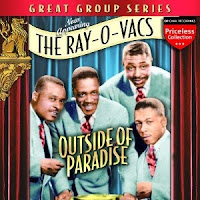 In the US two 22 track CDs were released on the Coleman label – “Besame Mucho” (Coleman 100) and “It’s Party Time with the Ray-O-Vacs” (Coleman 105). They’re probably just about impossible to find now.
In the US two 22 track CDs were released on the Coleman label – “Besame Mucho” (Coleman 100) and “It’s Party Time with the Ray-O-Vacs” (Coleman 105). They’re probably just about impossible to find now.

 A jive group who managed to get a hit in 1952 were The Four Blazes, with “Mary Jo” on the United label. Their sound was similar to that of The Ray-O-Vacs, with tasteful sax fills supplied by Eddie Chamblee. A 24 track Delmark CD, “Mary Jo” (DE-704) is highly recommended by your boogster pal. Oh, and by the way, I haven’t a clue who is playing sax on The Ray-O-Vacs’ sides. Can anyone help?
A jive group who managed to get a hit in 1952 were The Four Blazes, with “Mary Jo” on the United label. Their sound was similar to that of The Ray-O-Vacs, with tasteful sax fills supplied by Eddie Chamblee. A 24 track Delmark CD, “Mary Jo” (DE-704) is highly recommended by your boogster pal. Oh, and by the way, I haven’t a clue who is playing sax on The Ray-O-Vacs’ sides. Can anyone help?








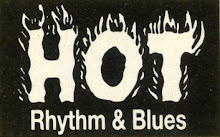
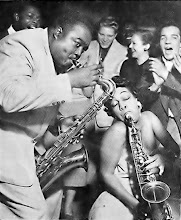







.jpg)
A.png)















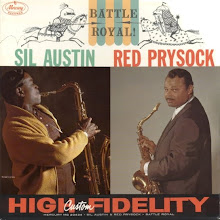
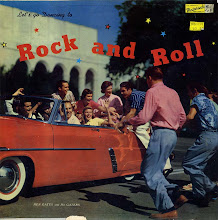
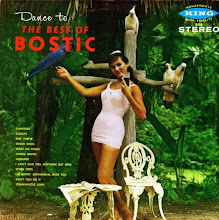
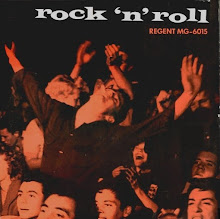
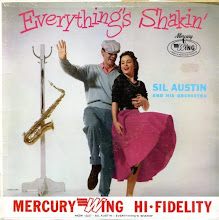






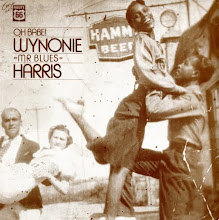

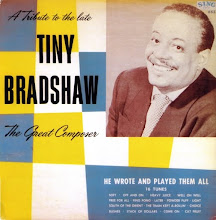





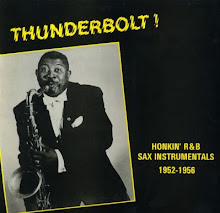

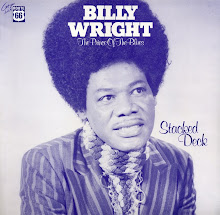






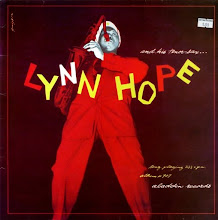



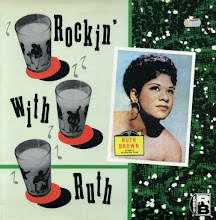


8 comments:
What a fantastic post. I've been looking for a decent Ray-o-Vacs collection for years. I love your blog. Many Thanks.
I know a labor of love when I see it and this is a fine example. Thank you very much.
ralph11
p.s. I'm curious as I've never seen on any blog the Johnny Otis double LP with his SAVOY recordings or the Capitol double LP with later hits such as Willie & The Hand Jive. I own both in pristine condition though I have not had the time to digitalize them. Let me know if you're interested, It would be my pleasure.
Hi Ralph
Thank you very much for your kind offer. Actually the original Be Bop Wino blog had two Johnny Otis double LPs of his Savoy recordings, plus a Charly LP of his Capitol recordings. I'll probably re-up them some day, with new cover scans, so there's no need for you to start digitising!
Oh, and there was also a Jukebox Lil comp, plus a Dig LP from Joan (which might be lurking in the present blog somewhere).
Someday ...
Another great post from the Wino!! Thanks Boogie Woody!
Oh Man! about 20 years ago Bob Koester from Delmark offered to sell me the masters for 1000$. Shit, I could hardly pay my rent let alone the masters of the Ray-o-Vacs. Then they just fell off the radar of my mind until now. Thank you very much!
I found out that the saxophonist was Leoparte "Chink" Kinney. Found that in a book on Newark nightlife by Barbara Kukla.
Thanks very much for the info, Koen. I might have to track that book down. I mentioned it on this post and also in a later post on Miss Rhapsody. Amazon Marketplace here I come!
Thank you for this great post!
Could you re-up "Besame Mucho," please?
Post a Comment